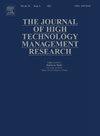You will never stand alone: The role of inter-organizational collaboration and technological turbulence in shaping small business' digital maturity
Q1 Business, Management and Accounting
Journal of High Technology Management Research
Pub Date : 2024-10-01
DOI:10.1016/j.hitech.2024.100518
引用次数: 0
Abstract
This study aims to analyze the influence of inter-organizational collaboration on the digital maturity of small businesses, moderated by the level of environmental technological turbulence. More specifically, the study identifies how the four sources of relational rents - relation-specific assets, complementary resources, knowledge-sharing routines, and effective governance - affect digital maturity treated as a form of relational rent. We surveyed 201 small businesses involved in inter-organizational collaboration agreements, and the survey data was analyzed using Partial Least Square Structural Equation Modeling (PLS-SEM) and fuzzy-set Qualitative Comparative Analysis (fsQCA). The findings indicate that relation-specific assets, complementary resources, and knowledge-sharing routines in inter-organizational collaboration help small businesses improve their digital maturity. We also found that technological turbulence positively moderates the relationship between knowledge-sharing routines and effective governance on one side and digital maturity on the other side. Furthermore, two combinations of relational sources and technological turbulence lead small businesses to reach high levels of digital maturity. The main theoretical contribution of the study is in identifying how specific combinations of sources of relational rents drive high levels of digital maturity.
你永远不会孤立无援:组织间合作和技术动荡对小型企业数字化成熟度的影响
本研究旨在分析组织间合作对小型企业数字化成熟度的影响,这种影响受环境技术动荡程度的调节。更具体地说,本研究确定了关系特定资产、互补资源、知识共享常规和有效治理这四种关系租金来源如何影响作为关系租金一种形式的数字化成熟度。我们对 201 家参与组织间合作协议的小型企业进行了调查,并使用偏最小二乘法结构方程模型(PLS-SEM)和模糊集定性比较分析(fsQCA)对调查数据进行了分析。研究结果表明,组织间合作中的特定关系资产、互补资源和知识共享例程有助于小企业提高数字化成熟度。我们还发现,技术动荡正向调节了知识共享常规和有效治理与数字化成熟度之间的关系。此外,关系源和技术动荡的两种组合会使小企业达到较高的数字化成熟度。本研究的主要理论贡献在于确定了关系租金来源的特定组合如何推动高水平的数字化成熟度。
本文章由计算机程序翻译,如有差异,请以英文原文为准。
求助全文
约1分钟内获得全文
求助全文
来源期刊

Journal of High Technology Management Research
Business, Management and Accounting-Strategy and Management
CiteScore
5.80
自引率
0.00%
发文量
9
审稿时长
62 days
期刊介绍:
The Journal of High Technology Management Research promotes interdisciplinary research regarding the special problems and opportunities related to the management of emerging technologies. It advances the theoretical base of knowledge available to both academicians and practitioners in studying the management of technological products, services, and companies. The Journal is intended as an outlet for individuals conducting research on high technology management at both a micro and macro level of analysis.
 求助内容:
求助内容: 应助结果提醒方式:
应助结果提醒方式:


